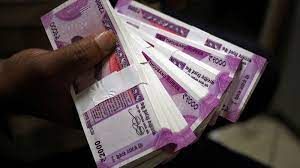Rs 2000 Notes Must Be Deposited by October 7; If You Don’t Return Currency To RBI, Here’s What Will Happen
The deadline for exchanging Rs 2,000 notes was extended by the Reserve Bank of India (RBI) from September 30 to October 7, 2023. After this date, however, only the 19 RBI Issue Offices will allow the exchange of 2000 banknotes, with a maximum cash deposit limit of Rs 20,000 per transaction.
There is no maximum amount for the Rs 2000 banknote deposits that individuals or organizations may make into their Indian bank accounts at any of the 19 RBI Issue Offices.
According to the RBI’s announcement, the following will occur starting on October 8:
At bank branches, deposits and exchanges will no longer be accepted.
With a maximum of Rs 20,000 per transaction, individuals and organizations may still exchange Rs 2000 banknotes at the 19 RBI Issue Offices.
There is no set dollar restriction on the quantity of Rs 2000 banknotes that individuals or corporations may deposit at the 19 RBI Issue Offices for crediting to their Indian bank accounts.
The Rs 2000 banknotes may be sent to any of the 19 RBI Issue Offices via India Post services, and the money will be credited to the recipient’s local bank accounts in India.
The credit or exchange will be subject to any relevant RBI/Government restrictions, the presentation of legitimate identification papers, and the RBI’s determination of reasonable diligence.
Any of the 19 RBI Issue Offices will accept Rs 2000 banknotes without any stipulated limit for judicial, law enforcement, governmental, or other public authorities involved in investigation or enforcement procedures.
What happens if someone doesn’t deposit or trade in their Rs. 2000 banknotes before October 7, 2023?
“Up to a maximum of Rs 20,000 at a time, individuals or corporations may exchange Rs 2000 banknotes at the 19 RBI Issue Offices. At any of the 19 RBI Issue Offices, people or entities may offer to submit Rs. 2000 banknotes in exchange for any sum to be credited to their Indian bank accounts. According to the central bank’s frequently asked questions, such an exchange or credit would be subject to applicable RBI and government rules, the provision of legitimate identification papers, and appropriate due diligence.







